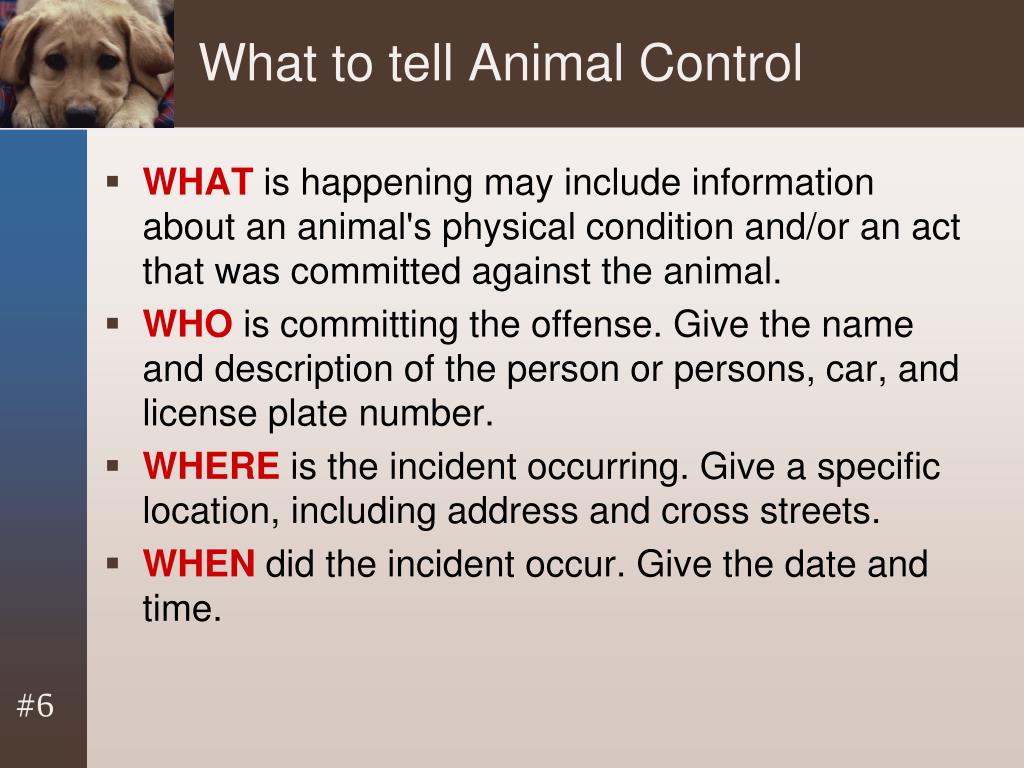In the realm of animal welfare, the role of animal control agencies is generally viewed as indispensable. Their purpose is to safeguard vulnerable animals and ensure compliance with regulatory statutes related to domestic and wildlife populations. However, there are instances when these agencies falter, prompting individuals to consider whether it is indeed possible to report animal control. The short response is yes, but the circumstances under which one should take this action—and the steps to do so—can be nuanced.
First and foremost, it is essential to delineate when a report against an animal control agency might be warranted. Situations that merit scrutiny include neglect of duty, failure to respond adequately to reports of animal cruelty, or instances of misconduct by animal control officers. If you observe that an agency is systematically ignoring calls for assistance regarding animal welfare, or if officers are exhibiting unprofessional behavior in the line of duty, these instances constitute legitimate grounds for complaint.
Moreover, there are specific scenarios that amplify the urgency of your report. For example, if an animal control officer fails to take action during a clear case of animal abuse or endangerment, this is not merely a misconduct issue—it could lead to dire consequences for the affected animals. Additionally, there may be instances where animal control personnel prioritize certain cases based on bias, epitomizing systemic issues of inequity within the agency. In such cases, not only is reporting critical, but it also serves as a step towards advocating for necessary reform.
Understanding the procedural framework for filing a complaint is paramount. Familiarizing yourself with the structure of the agency you wish to report is the first step. Most animal control agencies are associated with local government entities, municipalities, or county offices. This often means that your complaint should be directed to the particular department overseeing animal control operations. Look for dedicated channels—such as public-facing websites or hotlines—where issues can be reported.
When preparing your complaint, documentation is vital. Having a well-documented account of the events will fortify your position. This documentation should include timestamps, descriptions of the incidents, names of officers involved, and any evidence such as photographs or videos that corroborate your claims. In an age where digital documentation is ubiquitous, leveraging these tools can be exceedingly useful. Your account should also maintain a tone of professionalism and objectivity; emotional appeals, while understandable, may detract from the seriousness of your concerns.
Before proceeding, it is prudent to reflect on the impact your report may have on the broader community. Animal control agencies often operate under immense scrutiny and resource constraints. A well-articulated and thoughtful complaint can serve as a catalyst for positive change rather than an adversarial confrontation. It is not merely about holding an agency accountable but also about inspiring them to foster better practices that will ultimately benefit the animals they are sworn to protect.
After lodging your complaint, it is reasonable to expect a follow-up from the agency. Many jurisdictions have protocols in place for addressing grievances. This can vary from an informal meeting to discuss the concerns raised to a more formal investigation. Be prepared for the possibility that outcomes may not align perfectly with your expectations. However, persistence is often key in these situations, as reform processes can be laborious.
It is also important to understand the potential consequences of your report. Future interactions with the agency could prove complex, particularly if there is a culture of retaliation. It is advisable to document all interactions following your report. Keeping communication records can provide an additional layer of accountability in subsequent dealings. If you sense any form of retaliation, further steps can be taken, such as engaging with local media or advocacy groups dedicated to animal rights. Involving these organizations can galvanize public interest and support for reform, often pushing agencies to act more responsibly.
On a broader scale, individuals may wonder why this process is significant. Reporting animal control issues embodies a commitment to ethical stewardship of all creatures. It signifies an acknowledgment that accountability transcends mere operations; it encompasses a moral obligation to advocate for those without a voice. By addressing these systemic shortcomings, individuals contribute to an environment where animals are treated with the dignity they deserve.
As you engage with this issue, it becomes clear that reporting animal control is not simply about confronting failures. It is about fostering a culture of proactive accountability that can lead to enhanced operational standards and, consequently, a safer environment for animals. Change is forged not merely through criticism but through constructive dialogue and action. By understanding when and how to act, individuals can become vital participants in the larger narrative of animal welfare, ensuring that those entrusted with protecting animals truly uphold that sacred responsibility.
In conclusion, reporting issues within animal control may seem daunting, but it is an essential avenue for ensuring humane treatment of animals. By equipping yourself with knowledge about the process and articulating your concerns thoughtfully, you can pave the way for meaningful improvements, ensuring that animal control agencies fulfill their roles effectively and justly.










